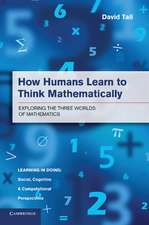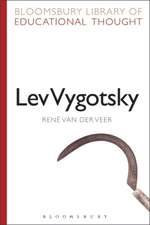The Nature of Mathematical Thinking: Studies in Mathematical Thinking and Learning Series
Editat de Robert J. Sternberg, Talia Ben-Zeeven Limba Engleză Paperback – sep 1996
The chapter authors were asked to focus on their own approach to mathematical thinking, but also to address a common core of issues such as the nature of mathematical thinking, how it is similar to and different from other kinds of thinking, what makes some people or some groups better than others in this subject area, and how mathematical thinking can be assessed and taught. Their work is directed to a diverse audience -- psychologists interested in the nature of mathematical thinking and abilities, computer scientists who want to simulate mathematical thinking, educators involved in teaching and testing mathematical thinking, philosophers who need to understand the qualitative aspects of logical thinking, anthropologists and others interested in how and why mathematical thinking seems to differ in quality across cultures, and laypeople and others who have to think mathematically and want to understand how they are going to accomplish that feat.
Din seria Studies in Mathematical Thinking and Learning Series
-
 Preț: 273.49 lei
Preț: 273.49 lei -
 Preț: 310.22 lei
Preț: 310.22 lei -
 Preț: 322.47 lei
Preț: 322.47 lei -
 Preț: 272.41 lei
Preț: 272.41 lei - 8%
 Preț: 380.38 lei
Preț: 380.38 lei -
 Preț: 272.82 lei
Preț: 272.82 lei -
 Preț: 332.84 lei
Preț: 332.84 lei -
 Preț: 191.51 lei
Preț: 191.51 lei -
 Preț: 281.09 lei
Preț: 281.09 lei - 15%
 Preț: 567.41 lei
Preț: 567.41 lei -
 Preț: 476.64 lei
Preț: 476.64 lei - 15%
 Preț: 466.40 lei
Preț: 466.40 lei - 18%
 Preț: 780.87 lei
Preț: 780.87 lei -
 Preț: 488.18 lei
Preț: 488.18 lei -
 Preț: 344.20 lei
Preț: 344.20 lei -
 Preț: 204.00 lei
Preț: 204.00 lei - 15%
 Preț: 566.43 lei
Preț: 566.43 lei -
 Preț: 399.24 lei
Preț: 399.24 lei - 18%
 Preț: 1278.88 lei
Preț: 1278.88 lei -
 Preț: 372.46 lei
Preț: 372.46 lei - 15%
 Preț: 447.16 lei
Preț: 447.16 lei - 15%
 Preț: 440.96 lei
Preț: 440.96 lei -
 Preț: 419.17 lei
Preț: 419.17 lei -
 Preț: 487.16 lei
Preț: 487.16 lei -
 Preț: 422.59 lei
Preț: 422.59 lei - 15%
 Preț: 586.90 lei
Preț: 586.90 lei - 19%
 Preț: 680.73 lei
Preț: 680.73 lei -
 Preț: 485.91 lei
Preț: 485.91 lei -
 Preț: 218.44 lei
Preț: 218.44 lei -
 Preț: 407.21 lei
Preț: 407.21 lei - 15%
 Preț: 474.93 lei
Preț: 474.93 lei -
 Preț: 355.64 lei
Preț: 355.64 lei -
 Preț: 441.54 lei
Preț: 441.54 lei -
 Preț: 490.57 lei
Preț: 490.57 lei - 18%
 Preț: 1061.57 lei
Preț: 1061.57 lei
Preț: 472.78 lei
Preț vechi: 556.22 lei
-15% Nou
Puncte Express: 709
Preț estimativ în valută:
90.48€ • 94.11$ • 74.69£
90.48€ • 94.11$ • 74.69£
Carte tipărită la comandă
Livrare economică 14-28 aprilie
Preluare comenzi: 021 569.72.76
Specificații
ISBN-13: 9780805817997
ISBN-10: 0805817999
Pagini: 352
Dimensiuni: 152 x 229 x 21 mm
Greutate: 0.47 kg
Ediția:1
Editura: Taylor & Francis
Colecția Routledge
Seria Studies in Mathematical Thinking and Learning Series
Locul publicării:Oxford, United Kingdom
ISBN-10: 0805817999
Pagini: 352
Dimensiuni: 152 x 229 x 21 mm
Greutate: 0.47 kg
Ediția:1
Editura: Taylor & Francis
Colecția Routledge
Seria Studies in Mathematical Thinking and Learning Series
Locul publicării:Oxford, United Kingdom
Public țintă
ProfessionalCuprins
Contents: Preface. Part I: A Psychometric Approach. J.B. Carroll, Mathematical Abilities: Some Results from Factor Analysis. Part II: Cognitive/Information-Processing Approaches. R.E. Mayer, M. Hegarty, The Process of Understanding Mathematical Problems. T. Ben-Zeev, When Erroneous Mathematical Thinking is Just as "Correct": The Oxymoron of Rational Errors. Part III: Cognitive/Cultural Approaches. K.F. Miller, D.R. Paredes, On the Shoulders of Giants: Cultural Tools and Mathematical Development. G.B. Saxe, V. Dawson, R. Fall, S. Howard, Culture and Children's Mathematical Thinking. D.C. Geary, Biology, Culture and Cross-National Differences in Mathematical Ability. Part IV: Cognitive/Educational Approaches. H.P. Ginsburg, Toby's Math. J. Bransford, L. Zech, D. Schwartz, B. Barron, N. Vye, The Cognition and Technology Group at Vanderbilt, Fostering Mathematical Thinking in Middle School Students: Lessons from Research. Part V: Mathematical Approaches. T. Dreyfus, T. Eisenberg, On Different Facets of Mathematical Thinking. C. Rickart, Structuralism and Mathematical Thinking. Part VI: Conclusions. R.J. Sternberg, What is Mathematical Thinking?
Recenzii
"Scholars and researcher [psychologists of every hue, psychometricians, sociologists, philosophers, educators, teachers, mathematicians, and policy makers] are likely to find something of interest in The Nature of Mathematical Thinking....I will return to several of the book's chapters because they are like binoculars magnifying particular details that I would like to follow up in the future."
—Journal for Research in Mathematics Education
"...as a whole [the chapters] offer a wealth of hypotheses and insights."
—The American Mathematical Monthly
"The book successfully offers a fresh perspective for researchers and theorists and at the same time makes some of the more technical aspects of the research accessible to nonspecialists."
—Mathematics Teacher
"...this book is valuable and makes a contribution to the cause of multidiciplinary investigations. This book will benefit the preparation of future scholars and teachers, too."
—Teaching Children Mathematics
"The success of this volume lies in the collection of clearly written chapters by authors who could aptly be said to represent prominent examples of distinct traditions in research on mathematical thinking."
—Contemporary Psychology
"...this volume represents a very useful bringing together of a broad range of approaches and will certainly be of great interest to all students and researchers concerned with mathematical thinking."
—British Journal of Mathematical & Statistical Psychology
"With such an ambitious project, one expects a very rich book, addressed to a very wide audience. A very difficult task. The reader is rewarded. It does not mean she/he will find the answers to so well posed and straightforward questions, but will surely learn about the progress made by scholars, of different areas, to deal with these questions. The difficult task of preparing a book with such a large scope depends largely on a good organization and a well chosen team of experts. The editors succeeded in this double strategy."
—Zentralblatt MATH
"The volume is intended for educators and mathematics teachers, psychologists, cognitive scientists, mathematicians, computer scientists, anthropologist, philosophers interested in logical-mathematical thinking, and the interested general public. Essays are written at a level that is accessible to this diversity of audiences."
—Zentralblatt fr Didaktik der Mathematik
—Journal for Research in Mathematics Education
"...as a whole [the chapters] offer a wealth of hypotheses and insights."
—The American Mathematical Monthly
"The book successfully offers a fresh perspective for researchers and theorists and at the same time makes some of the more technical aspects of the research accessible to nonspecialists."
—Mathematics Teacher
"...this book is valuable and makes a contribution to the cause of multidiciplinary investigations. This book will benefit the preparation of future scholars and teachers, too."
—Teaching Children Mathematics
"The success of this volume lies in the collection of clearly written chapters by authors who could aptly be said to represent prominent examples of distinct traditions in research on mathematical thinking."
—Contemporary Psychology
"...this volume represents a very useful bringing together of a broad range of approaches and will certainly be of great interest to all students and researchers concerned with mathematical thinking."
—British Journal of Mathematical & Statistical Psychology
"With such an ambitious project, one expects a very rich book, addressed to a very wide audience. A very difficult task. The reader is rewarded. It does not mean she/he will find the answers to so well posed and straightforward questions, but will surely learn about the progress made by scholars, of different areas, to deal with these questions. The difficult task of preparing a book with such a large scope depends largely on a good organization and a well chosen team of experts. The editors succeeded in this double strategy."
—Zentralblatt MATH
"The volume is intended for educators and mathematics teachers, psychologists, cognitive scientists, mathematicians, computer scientists, anthropologist, philosophers interested in logical-mathematical thinking, and the interested general public. Essays are written at a level that is accessible to this diversity of audiences."
—Zentralblatt fr Didaktik der Mathematik
Notă biografică
Robert J. Sternberg, Talia Ben-Zeev















